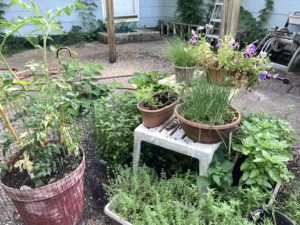My Father’s Gardens, a Remembrance
Typically, my gardens are puny things. Besides flowers, they usually include herbs like basil, mint, chives, parsley, and occasionally a tomato plant in pots on our patio. But my father’s gardens were often superb.
My father, Homer Dale Willman, Sr., used to say, “When the Corps hired me, they took a great farmer and made him into a half-assed engineer.”
Still, though he worked over twenty years for the U.S. Army Corps of Engineers, my father always had a garden. Until his last summer, he grew at least a little something, maybe vibrant begonias, a geranium in a big pot, a climbing rose, possibly hollyhocks, and usually mint so he could watch the telecast of the Kentucky Derby on the first Saturday in May with an icy julep in hand. And always, always, he had a tomato plant or two.
Back in the fifties and sixties, the prime years of his backyard gardens, he put lots of effort into his tomatoes. We lived in the tri-state region of Kentucky, Ohio and West Virginia where winters were mild (though Dad always hoped for some snow to put nitrogen into the dirt). After the ground warmed and softened along about Easter, Dad took his shovel out to his garden patch to prepare the soil.
My mom used to kid my dad about “digging to China” because to him preparation meant digging a pit eighteen inches across and three feet deep for each tomato plant. He partially refilled each hole with compost, manure and other nourishing substances mixed with loose dirt.
The newly planted tomato plants–named Big Boy, Better Boy, Early Boy and Rutgers–looked scrawny so far apart, their sparse leaves insufficient to fuel growth. They did grow though. Usually by the Fourth of July, Dad would push aside those leaves, releasing the acrid odor that set our stomachs to growling, and with a gentle tug, pick the first tomato of the season. Mom, Dad, my brother Dale, and I fought over that first tomato, so ripe the skin peeled off clean and biting the tongue with its acidity. By late summer, the plants, lovingly tied to their stakes with strips of old sheets, stood eight feet high and loaded with tomatoes that Mom canned, made juice with, or begged neighbors to haul away.
Maybe the secret of Dad’s tomatoes lay in his compost pile that he researched, constructed, and maintained like a true engineer. The compost pile I remember best was a four-foot cube of vegetable peels and melon rinds, musty grass clippings, twigs, lime, and goat manure he got as partial payment for a ship model he built for a friend who owned a herd of goats.
Dad made a hole in the center of the compost pile so air got inside and furthered the controlled decay. Once, out of curiosity, he tied some string to a thermometer and lowered it into the hole. In less than a minute, the thermometer broke. Later, with Mom’s candy thermometer, Dad discovered that the compost pile had reached 135 degrees.
After we moved into town, Dad scaled his gardens small, but back in the late forties when we lived in the aptly named Garden Court over in Ohio, he almost filled the back yard with his vegetable plot. Forty by sixty feet, it ran from the house back almost to the tree-lined creek. Pieces of string stretched between sticks defined the plot so meticulously it looked like Dad had laid the garden out with a surveyor’s transit.
Dad bragged about that garden having fifty different varieties of plants. They included tomatoes of course, potatoes, corn, green peppers, red peppers, scallions, onions, cucumbers, and Black-seeded Simpson leaf lettuce. Instead of cantaloupe, that Dad said didn’t prosper in our climate, he grew muskmelons. Radishes started the growing season and beets finished it. Many of the vegetables he planted I’ve forgotten now, but I still love to recite exotic names like zucchini, kohlrabi, and cocozelle.
We all got involved in Dad’s gardens. One year we had so much cabbage that Mom canned it. Dad paid Dale a penny a hundred head to pick bugs and beetles out of the garden. Dad never let me forget that those pretty yellow hollyhocks I picked one year were actually squash blossoms. Once, we tried to shell tough-hulled soybeans by putting them through Mom’s washer wringer. The beans popped out the other side, and Dale and I chased them as they bounced around the kitchen floor.
My father’s gardens . . . Whenever I think of them, I picture him in my mind. Small-boned, with a mustache, my father wears a billed cap to keep his scalp from burning, a tan shirt dark with sweat under the arms, tan pants cut off and neatly hemmed above his knobby knees, and muddy shoes too worn to wear to work anymore. He leans against a shovel stuck into a pile of dirt. And dreaming of fresh tomatoes by the Fourth of July, he grins.

